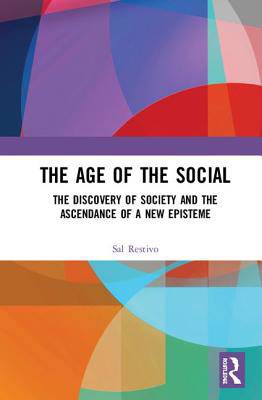
- Afhalen na 1 uur in een winkel met voorraad
- Gratis thuislevering in België vanaf € 30
- Ruim aanbod met 7 miljoen producten
- Afhalen na 1 uur in een winkel met voorraad
- Gratis thuislevering in België vanaf € 30
- Ruim aanbod met 7 miljoen producten
The Age of the Social
The Discovery of Society and the Ascendance of a New Episteme
Sal RestivoOmschrijving
The concept of society sui generis - society as a level of reality which could be studied scientifically - crystallized in the middle of the nineteenth century in Europe, with the work of Durkheim, Marx and Weber and today, more than at any other period in history, the idea of the social has gained a foothold in philosophy, biology, and neuroscience. However, this idea has emerged into prominence not through the historical or contemporary efforts of sociologists, but mainly through the efforts of biologists and neuroscientists.
This book seeks to re-establish the credentials of sociology as the science of society. While acknowledging the amalgamation of traditional disciplines into interdisciplinary and multidisciplinary networks of research and theory, and championing interdisciplinarity in recognising the capacity of converging perspectives to yield more interesting general theories of social life, the author defends disciplinarity in maintaining sociology's achievements as a discipline.
With chapters on the sociological world view, imagining society, the self, love, education, mathematics and religion, The Age of the Social re-states the importance of sociology as the source of robust ideas about the social in an age in which this notion has grown in importance. As such, it will appeal to scholars across the social sciences, with interests in method and philosophy in the social disciplines.
Specificaties
Betrokkenen
- Auteur(s):
- Uitgeverij:
Inhoud
- Aantal bladzijden:
- 228
- Taal:
- Engels
Eigenschappen
- Productcode (EAN):
- 9781138234369
- Verschijningsdatum:
- 18/06/2018
- Uitvoering:
- Hardcover
- Formaat:
- Genaaid
- Afmetingen:
- 156 mm x 234 mm
- Gewicht:
- 526 g

Alleen bij Standaard Boekhandel
Beoordelingen
We publiceren alleen reviews die voldoen aan de voorwaarden voor reviews. Bekijk onze voorwaarden voor reviews.











